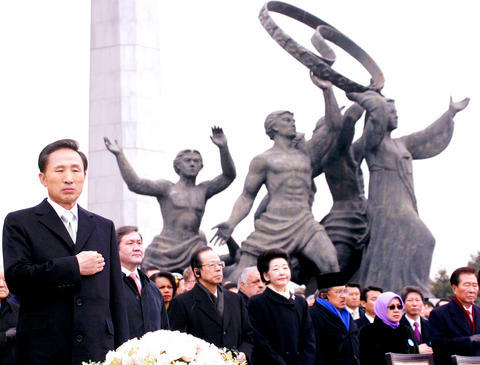South Korean President Lee Myung-bak, the nation's first president with a business background, pledged to cut taxes and speed up deregulation to encourage investment and boost economic growth.
"Unnecessary regulations will be either cast away or reformed as early as possible," Lee said in his inauguration speech in Seoul yesterday. "We must lower taxes as well. Only then will we see investments and consumption increase once again."
After winning a landslide victory on Dec. 19, the former Seoul mayor, 66, has to live up to a campaign promise to increase South Korea's economic growth to 7 percent and double per capita income to US$40,000 by 2017.

PHOTO: AP
Lee is "obviously hoping that his can-do attitude, deregulation and other measures will bring in investment," said Kang Chul-kyu, an economics professor at University of Seoul, and a former chief of the Fair Trade Commission.
The new administration will "create an environment where entrepreneurs can invest freely, and our companies can roam the world market with much excitement," Lee said.
Lee, nicknamed the "Bulldozer" while running Hyundai Engineering & Construction Co, had previously announced a plan to make housing more affordable, his intention to shrink government by merging ministries and a program to improve the English- language skills of students.
The president is banking on non-government investment to fund housing loans and a 16 trillion won (US$16.8 billion) project to build a "Great Waterway," a network of canals through South Korea and branching up to the North Korean capital of Pyongyang.
Asia's fourth-largest economy expanded 4.9 percent last year from a year earlier, and Lee is aiming for growth of about 6 percent this year, higher than forecasts by the Ministry of Finance and the Bank of Korea.
The Great Waterway, which would begin with a 20km link between two rivers, will ultimately become a 2,100km waterway from Busan to Seoul. Lee says he would extend it another 1,000km north from the demilitarized zone if North Korea fulfills its pledge on dismantling nuclear weapons.
Lee's former firm is among those that have met to plan the project.
Lee and his Grand National Party also face the challenge of increasing trade with allies and neighbors. He will encourage the National Assembly to ratify a free-trade agreement with the US signed last June.

Japanese Prime Minister Sanae Takaichi yesterday lavished US President Donald Trump with praise and vows of a “golden age” of ties on his visit to Tokyo, before inking a deal with Washington aimed at securing critical minerals. Takaichi — Japan’s first female prime minister — pulled out all the stops for Trump in her opening test on the international stage and even announced that she would nominate him for a Nobel Peace Prize, the White House said. Trump has become increasingly focused on the Nobel since his return to power in January and claims to have ended several conflicts around the world,

UKRAINE, NVIDIA: The US leader said the subject of Russia’s war had come up ‘very strongly,’ while Jenson Huang was hoping that the conversation was good Chinese President Xi Jinping (習近平) and US President Donald Trump had differing takes following their meeting in Busan, South Korea, yesterday. Xi said that the two sides should complete follow-up work as soon as possible to deliver tangible results that would provide “peace of mind” to China, the US and the rest of the world, while Trump hailed the “great success” of the talks. The two discussed trade, including a deal to reduce tariffs slapped on China for its role in the fentanyl trade, as well as cooperation in ending the war in Ukraine, among other issues, but they did not mention

REASSURANCE: The US said Taiwan’s interests would not be harmed during the talk and that it remains steadfast in its support for the nation, the foreign minister said US President Donald Trump on Friday said he would bring up Taiwan with Chinese President Xi Jinping (習近平) during a meeting on the sidelines of the APEC Summit in South Korea this week. “I will be talking about Taiwan [with Xi],” Trump told reporters before he departed for his trip to Asia, adding that he had “a lot of respect for Taiwan.” “We have a lot to talk about with President Xi, and he has a lot to talk about with us. I think we’ll have a good meeting,” Trump said. Taiwan has long been a contentious issue between the US and China.

GLOBAL PROJECT: Underseas cables ‘are the nervous system of democratic connectivity,’ which is under stress, Member of the European Parliament Rihards Kols said The government yesterday launched an initiative to promote global cooperation on improved security of undersea cables, following reported disruptions of such cables near Taiwan and around the world. The Management Initiative on International Undersea Cables aims to “bring together stakeholders, align standards, promote best practices and turn shared concerns into beneficial cooperation,” Minister of Foreign Affairs Lin Chia-lung (林佳龍) said at a seminar in Taipei. The project would be known as “RISK,” an acronym for risk mitigation, information sharing, systemic reform and knowledge building, he said at the seminar, titled “Taiwan-Europe Subsea Cable Security Cooperation Forum.” Taiwan sits at a vital junction on